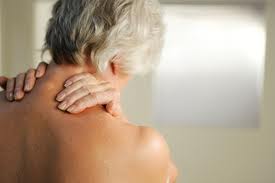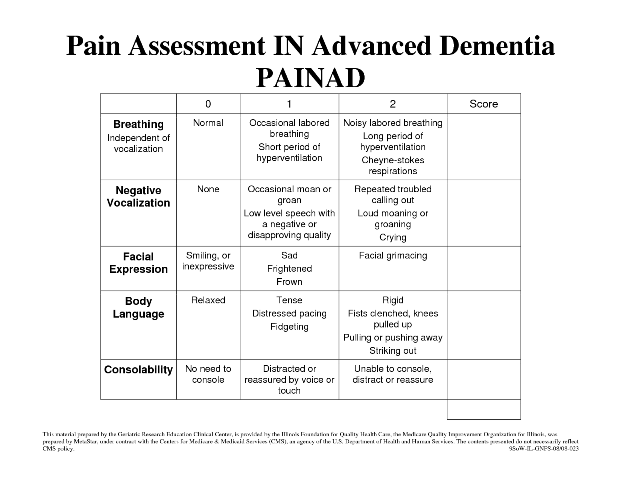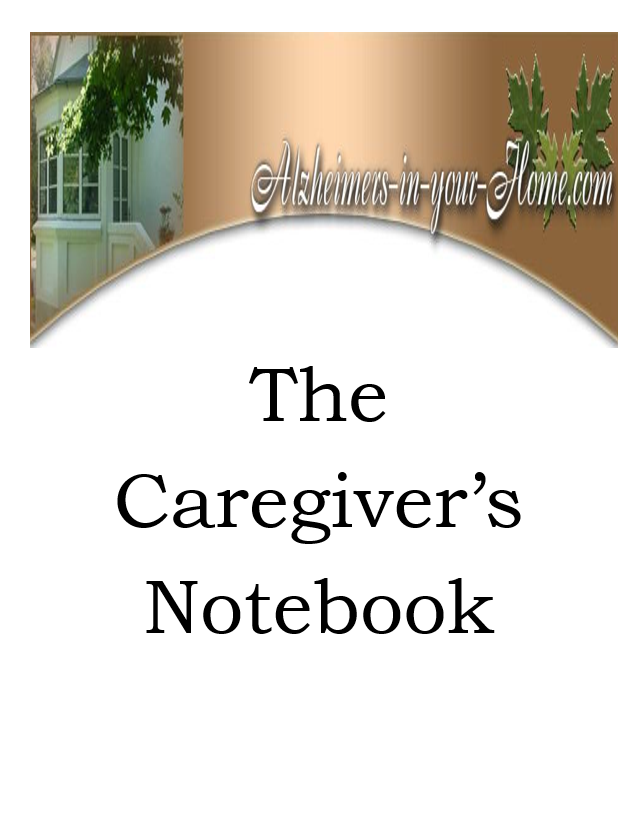Assessing Alzheimers Pain

When I refer to Alzheimers pain, I simply mean someone with Alzheimers who has pain anywhere in their body and is unable to communicate that pain to a caregiver. Alzheimers disease by itself is not painful. Unfortunately most people with Alzheimers are elderly and have other medical conditions which may cause pain. Alzheimers Pain can be the cause of behaviors
It can be very difficult to determine if someone with Alzheimer's Disease is having pain.
They may not be able to communicate their pain to you.
Are they aggressive or agitated?
Are they restless?
Did they have problems with pain before the Alzheimers?
Someone with a diagnosis like arthritis can have daily aches and pains.
Alzheimers pain may be present in a diabetic. Diabetics often get neuropathy, which is a numbness/tingling/burning feeling in their hands or feet.
Alzheimers Pain there are Consequences When Left Untreated !

Functional losses, depression
Immobility/contractures/wounds
Cognitive impairment/agitation
Weight loss/anorexia/sleep problems
Decreased quality of life
Increased Behaviors
Myths of Pain Management

Myths:
Old people don’t feel pain as much.
I Just Have to Live with the Pain
Bed Rest Is Usually the Best Cure for Pain.
Facts:
For most causes of arthritis or joint pain, keeping up your normal schedule -- including your physical activity -- will help you feel better.
The odds of developing a painful condition, such as arthritis,is higher as we age. But those conditions can be treated and the pain can be well-controlled.
Assessing Alzheimers Pain

You will need to help your doctor figure out if your family member is having any pain. The better picture you can paint for him the more appropriately he will be able to treat any pain. The following information will help you paint that picture.
Location: Ask if pain seems to radiate from one position to another: i.e..., from the back, down leg, from abdomen to back.
Quality: Describe what it feels like in the family members words if possible. The way in which a pain is described is often a clue to its origin.
Timing: In relationship to events, meals, bathing or change in position. Does it begin suddenly or come on gradually? Does it seem worse at night or in morning?
Severity: Describe in terms of what it is now, and at its worst. Determine if pain is mild, moderate, severe, or very severe . Watch for non-verbal signs of pain, especially in the person who cannot describe the pain severity himself. Use your own judgment to rate severity when your family member can not. Factors which worsen or improve pain? Medication, relaxation, movement, breathing, position, bracing, sitting, lying down or one side etc....
Consequences of untreated Alzheimers pain: Pain can affect all areas of their life including: activity, function, sleep, ADL, mobility, appetite, quality of life, agitation, confusion, and increased difficulty in providing care. The Painad assessment tool can be helpful determining if your family member is having pain. Watch them for at least 5 minutes at different times during the day.
There are signs to watch for though. One of the best times to determine if someone has pain is while they are getting dressed or undressed. When they walk do they hang on to furniture or the wall? It may be for added balance but it can also be pain related.
Watch their facial expressions. Do they grimace? Do they pull away?
I have found a tylenol 2 or 3 times a day can help with Alzheimers pain. Especially a dose at bedtime.It can help them sleep better if they are having discomfort at night. Ask your Doctor if it is ok to start your family member with Alzheimers Disease on a scheduled routine of tylenol

Do you know what stage of Alzheimer's Disease your loved one is in?
Do you know what to watch for next?
Do you have sitters coming in and need to have a better system to help them provide the best care?
Does your loved one have behaviors that you should be tracking?
Do you have all of the information written down you need when you go to your doctor visits to help them understand what needs you may have?
Do you need help keeping track of appointments, medicines, vital signs, weights, meals, bowels, and behaviors?
The Caregivers Notebook will help you recognize what stage your loved one is in and prepare for what is coming next for your loved one.
It is very important you understand the disease and know what is coming next!
I also have an Alzheimers Blog site
Please check it out if you have time, I believe there is a lot of information you may find helpful.

